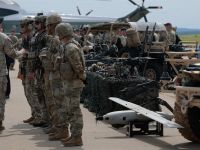A new round of U.N.-brokered peace talks between Syria’s government and the opposition has made no progress, Faisal Mokdad, the country’s deputy foreign minister said Friday, according to Agence France-Presse.
“We deeply regret that this round did not make any progress,” Mokdad told reporters, as both sides traded blame over the deadlock in the second round of the Geneva talks which started Monday.
“We have done our best” on humanitarian access but some statements by U.N. humanitarian chief Valerie Amos are “absolutely unacceptable,” Mokdad said, according to Reuters.
Speaking separately just minutes earlier, Louay Safi the Syrian opposition spokesperson complained about the other side’s failure to budge.
“The negotiations have reached an impasse,” Safi said.
“If this situation does not change .. It means that the negotiations are not moving towards a political solution. We are now awaiting serious progress,” he added.
Meanwhile, Sergei Lavrov, the Russian foreign minister, accused backers of the Syrian opposition of seeking “regime change” and said the creation of a transitional governing body must not be the sole focus of peace talks in Geneva.
Lavrov said there were ongoing attempts to derail the talks and suggested the opposition and its backers were to blame.
He added that warnings that the negotiations could not go on forever were neither constructive nor logical after only two rounds.
Also on Friday, Amos described the evacuation of civilians from the besieged Syrian city of Homs as a “remarkable” achievement but warned 250,000 people across the war-torn country were awaiting help.
Amos said the Homs operation should not serve as a model for future efforts.
“It was a success given the extremely difficult circumstances, but not a progress,” Agence France-Presse quoted her as saying.
She added: “We evacuated 1,400 people but there (are) nearly 250,000 more to go if you look at all the besieged communities.”
Amos told reporters that the U.N. had received “verbal assurances” from both sides in the conflict that the truce around Homs would be extended but officials were still awaiting written confirmation.
“We can’t continue without those written assurances,” she said.
Amos called on the 15-member U.N. Security Council to “use their influence over parties to ensure they abide by pauses, give humanitarian access, commit in writing to upholding international humanitarian laws.”
She expressed frustration at the “extremely limited and painstakingly slow” progress.
“That’s why we are all not only pessimistic, but so frustrated,” she said.
Third round of peace talks
Meanwhile, international mediator Lakhdar Brahimi plans to take Syrian peace talks into a third round, an opposition official said on Friday, as negotiations neared the end of a second week with no sign of progress.
“Brahimi just told us the talks will continue and there will be a third round, but he did not set a date,” opposition negotiator Ahmad Jakal told Reuters. There may also be a further session of talks on Saturday, he added.
Jakal’s statement came after the council was grappling with rival resolutions on the humanitarian crisis - a Western and Arab-backed proposal that threatened sanctions and a Russian text that makes no mention of sanctions.
The new standoff between Russia and the West in the Council over the aid resolutions has contributed to the deadlock in Geneva, while continuing fighting has left tens of thousands under siege and hoping for relief from abroad.
Russia said it had presented a draft U.N. resolution on fighting “terrorism” in Syria and its own plan for improving aid access, throwing down a challenge to Western states in the Council which proposed another formulation that Moscow says would open the way for Western military intervention.
In Geneva, where the second round of peace talks has made little progress since Monday, Western diplomats and the Syrian opposition delegates have complained that President Bashar al-Assad’s government was refusing to discuss proposals for a transition of power and hoped Russia would press it to do so.
Meanwhile, U.S. Ambassador Samantha Power said the West was seeking a resolution “that will make a meaningful difference on the ground.”
“For us, given the gravity of the situation, better no resolution than a bad resolution,” Power said.








